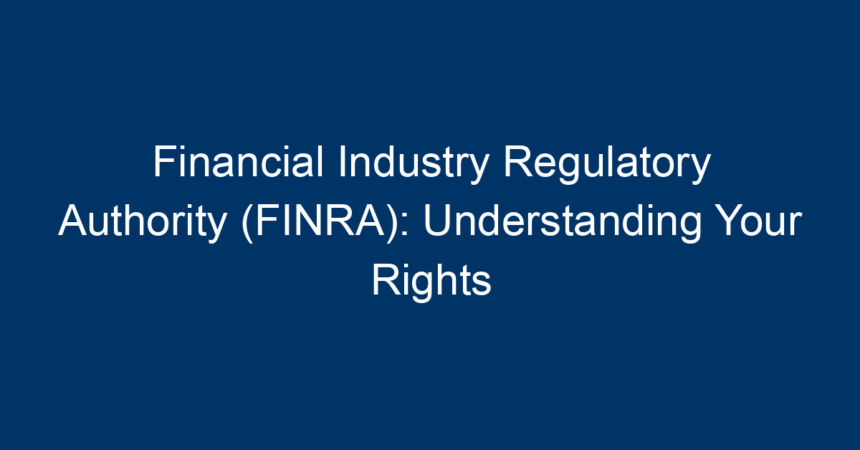In the complexity of the financial world, consumers often find themselves navigating a labyrinth of regulations, policies, and financial products. The Financial Industry Regulatory Authority (FINRA) stands as a critical watchdog in this landscape, working tirelessly to protect investors and ensure market integrity. But what does FINRA do, and how can you, as an investor or consumer, ensure your rights are safeguarded? This article provides a comprehensive overview of FINRA, its functions, and your rights as an investor.
What is the Financial Industry Regulatory Authority (FINRA)?
The Financial Industry Regulatory Authority (FINRA) is a non-governmental organization that oversees brokerage firms and exchange markets. Established in 2007, FINRA was created to enhance investor protection and safeguard market integrity through effective regulation. It operates under the supervision of the Securities and Exchange Commission (SEC) and is pivotal in ensuring that brokers and firms adhere to industry standards.
Key Functions of FINRA
-
Regulatory Oversight: FINRA develops rules and regulations that govern the behavior of member firms and their registered representatives. These rules are designed to promote fair trading practices and reduce risks for investors.
-
Investor Education: FINRA prioritizes investor education, providing a wealth of resources to help individuals make informed financial decisions. From webinars to printable guides, it empowers consumers with knowledge about investing and financial rights.
-
Dispute Resolution: FINRA offers arbitration and mediation services for resolving disputes between investors and brokerage firms. This process is designed to be time-efficient and more affordable than traditional litigation.
-
Rule Enforcement: By conducting regular examinations of brokers and firms, FINRA ensures compliance with its regulations. Firms must adhere to these standards to maintain—often costly—licenses and avoid fines.
- Data Collection and Analysis: FINRA collects a vast amount of data related to market transactions and trading practices. This information is essential for analyzing trends and identifying potential misconduct.
Your Rights as an Investor
Understanding your rights as an investor is crucial in navigating the financial landscape. FINRA provides several protections that every investor should be aware of:
1. Right to Fair Treatment
Every investor has the right to be treated fairly and ethically by brokerage firms. FINRA rules prohibit practices such as fraud, manipulation, and disproportionately high commissions. If you suspect unethical treatment, you can file a complaint with FINRA.
2. Right to Complete Information
As an investor, you have the right to receive comprehensive information about the investments you are considering. This includes details about risks, fees, and potential rewards. FINRA mandates that firms provide clients with all necessary disclosures prior to engaging in any transaction.
3. Right to Make Informed Decisions
FINRA empowers you to make informed decisions. The organization provides educational materials through its website and community outreach programs. Tools like the "BrokerCheck" platform allow you to research individual brokers and investment firms, ensuring you are well-informed before entrusting them with your money.
4. Right to Seek Justice
If you find yourself in a dispute with a brokerage firm, you have the right to seek justice through FINRA’s arbitration or mediation services. These processes are designed to be user-friendly and protect your rights without the need for extensive legal fees.
5. Right to Complaint Resolution
FINRA has a system in place for handling complaints. If you experience issues with your brokerage, you can submit a complaint via the FINRA website. The organization takes these complaints seriously, and they can lead to investigations of firms’ practices.
How Does FINRA Protect You?
The FINRA framework is designed to create a safe environment for investors. Here’s how it works:
Robust Regulation
FINRA’s intricate regulatory framework establishes rules that firms must follow, covering everything from advertising practices to handling customer funds. Non-compliance may result in significant penalties, ensuring that firms adhere to ethical standards.
Transparent Practices
Through transparency requirements, investors get access to essential information about their brokers and the investment products they offer. This transparency helps build trust and allows individuals to make decisions based on accurate information.
Continuing Education
FINRA advocates for continuous learning, both for professionals within the industry and investors alike. By providing educational resources, it aims to equip investors with the knowledge necessary to navigate their financial journey confidently.
Monitoring and Enforcement
FINRA diligently monitors trading practices to detect any signs of misconduct, including insider trading or market manipulation. When violations occur, FINRA is prepared to take action, ensuring that offenders are held accountable.
Steps to Take If You Have a Complaint
If you believe that your rights have been violated as an investor, it’s vital to take immediate action. Here’s a step-by-step guide:
Step 1: Document Everything
Keep a detailed record of all communications and transactions related to your investment. Screenshots, emails, and a diary of conversations will all be useful.
Step 2: Review Your Options
Visit the FINRA website to familiarize yourself with your rights and the complaint process. Consider contacting a legal professional if necessary.
Step 3: File a Complaint
You can file a complaint directly through the FINRA online portal. Be clear and concise in explaining your issue, providing all relevant documentation to support your case.
Step 4: Follow Up
After submitting your complaint, keep track of the progress and follow up with FINRA if necessary. Being diligent can help ensure your complaint is handled efficiently.
Step 5: Utilize Mediation or Arbitration
If you are unsatisfied with the resolution, consider arbitration or mediation through FINRA. This can be a more streamlined and cost-effective way to settle disputes than going to court.
Conclusion: Empowering Yourself in the Financial Market
Understanding the role of the Financial Industry Regulatory Authority (FINRA) and your rights as an investor is crucial in today’s ever-evolving financial landscape. Armed with this knowledge, you can navigate your investments more confidently, knowing that a robust regulatory body is there to protect you.
Incorporate continuous learning into your investment strategy; leverage FINRA’s resources, and stay aware of your rights. Whether you’re just beginning your financial journey or are an experienced investor, awareness and proactive action can empower you to make well-informed choices.
By understanding your rights and the protections afforded to you, you can engage with the financial world more confidently, knowing that you’re equipped to handle any challenges that may arise.




